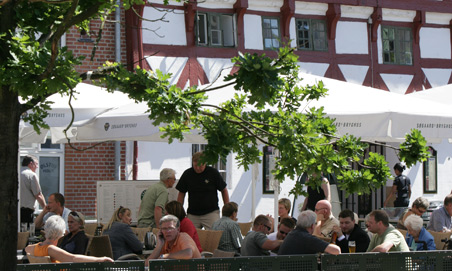Keynotes
Wil van der Aalst: Service Mining: Using Process Mining to Discover, Check, and Improve Service Behavior
Slides
Abstract:
Web services are an emerging technology to implement and integrate business processes within and across enterprises. Service-orientation can be used to decompose complex systems into loosely coupled software components that may run remotely. However, the distributed nature of services complicates the design and analysis of service-oriented systems that support end-to-end business processes. Fortunately, services leave trails in so-called event logs and recent breakthroughs in process mining research make it possible to discover, analyze, and improve business processes based on such logs. In this keynote, Wil van der Aalst will focus on the opportunities and challenges for service mining, i.e., applying process mining techniques to services.
Service mining is concerned with (a) the discovery of service behavior, (b) checking conformance of services, and (c) service model extension (e.g., showing bottlenecks based on event data). Examples of challenges specific for service mining are: (a) “How to Correlate Instances?” and (b) “How to Analyze Services Out of Context?”. These challenges show that, despite the huge potential of service mining, additional research is needed to improve the applicability of process mining in distributed and loosely coupled systems.
Short biography

Prof.dr.ir. Wil van der Aalst is a full professor of Information Systems at the Technische Universiteit Eindhoven (TU/e). Currently he is also an adjunct professor at Queensland University of Technology (QUT) working within the BPM group there. His research interests include workflow management, process mining, Petri nets, business process management, process modeling, and process analysis. Wil van der Aalst has published more than 150 journal papers, 17 books (as author or editor), 300 refereed conference/workshop publications, and 50 book chapters. Many of his papers are highly cited (he has an H-index of more than 94 according to Google Scholar, making him the European computer scientist with the highest H-index) and his ideas have influenced researchers, software developers, and standardization committees working on process support. He has been a co-chair of many conferences including the Business Process Management conference, the International Conference on Cooperative Information Systems, the International conference on the Application and Theory of Petri Nets, and the IEEE International Conference on Services Computing. He is also editor/member of the editorial board of several journals, including the Distributed and Parallel Databases, the International Journal of Business Process Integration and Management, the International Journal on Enterprise Modelling and Information Systems Architectures, Computers in Industry, Business & Information Systems Engineering, IEEE Transactions on Services Computing, Lecture Notes in Business Information Processing, and Transactions on Petri Nets and Other Models of Concurrency. In 2012, he received the degree of doctor honoris causa from Hasselt University. He is also a member of the Royal Holland Society of Sciences and Humanities (Koninklijke Hollandsche Maatschappij der Wetenschappen) and the Academy of Europe (Academia Europaea).
For more information about his work visit: www.workflowpatterns.com, www.workflowcourse.com, www.processmining.org, www.yawl-system.com, www.wvdaalst.com.
Contact information:
Prof.dr.ir. W.M.P. van der Aalst
Eindhoven University of Technology
Department of Mathematics and Computer Science (MF 7.103)
PO Box 513
NL-5600 MB Eindhoven
The Netherlands
Phone: +31 40 247.4295/2733
E-mail: w.m.p.v.d.aalst@tue.nl
www: www.vdaalst.com
Sean Wang: How to Share Data Securely
Abstract:
Data is increasingly available in a digital form, and data about us is being continuously collected. Such data has made possible many interesting and useful applications, and in essense made it possible for the Web to exist in the current form. Sharing this data makes a lot of sense for many reasons. However, personal privacy has become a concern. In this talk, I will touch upon a recent study of the privacy data leakage problem of mobile apps in China, and discuss various ways to protect user data. However, completely locking up data is neither desirable nor necessary. How to share our data in a secure way becomes an interesting question. Privacy protection of data has been a research problem for decades, with many interesting results emerging in the last 15 or so years. In this talk, I will discuss a framework for secure data sharing, linking many of the existing solutions under a unified principle. The hope is to develop new insights and better data sharing methods.
Short biography

Sean Wang is Professor and Dean at the School of Compute Science, Fudan University, Shanghai, China. He received his PhD degree in Computer Science from the University of Southern California, Los Angeles, California, USA, in 1992. Before joining Fudan University in 2011, he was the Dorothean Chair Professor in Computer Science at the University of Vermont, Burlington, Vermont, USA, and between 2009-2011, he served as a Program Director at the National Science Foundation, USA, in the Division of Information and Intelligent Systems. He has published widely in the general area of databases and information security, and was a recipient of the US National Science Foundation Research Initiation and CAREER awards. His research interests include database systems, information security, data mining, and sensor data processing. In the research community, he served as the general chair of ICDE 2011 held in Washington DC, and in other roles at international conferences and journals, including PC co-chair of MDM 2013, WISE 2012, PC member of past SIGMOD, CIKM, ICDE and many other conferences, current associate editor of Geoinformatica and WWW journal, and past associate editor of TKDE and KAIS.
Jan Borchers: An Internet of Custom-Made Things: From 3D Printing and Personal Fabrication to Personal Design of Interactive Devices
Slides

Abstract:
In the homes of bleeding-edge tinkerers around the world, a revolution is happening that, as many predict, will overshadow the PC and internet revolutions that began with home computers in the 70's: Personal Fabrication. Sub-$1000 3D printers are a reality, and other computer-controlled digital fabrication tools such as lasercutters are close behind. Research labs are printing anything from molecules to entire houses, and Fab Labs around the world are introducing the public to the possibilities and dangers of this new era in production.
On the one hand, these tools are bringing exciting changes to the way we teach and do ubicomp and HCI research: Instead of merely creating on-screen prototypes, students are now able to rapidly create actual working, networked hardware prototypes with little effort, driving home the message that successful interactive products today require software and hardware design to go hand in hand. As personal fabrication technologies evolve to include multiple materials and even electronics in custom-made objects, their interface will likely be mediated via online services, leading to new challenges for how to create the appropriate web-based architectures for an Internet of Custom-Made Things. On the other hand, it is still largely unclear how users at home should create those 3D models to print or otherwise fabricate on their desktop factory of the near future: For example, will they download and customize online designs, specifying their search queries for object models via hand shape gestures in mid-air? This is a major challenge for HCI that calls for radically new user interface approaches, paradigms and interaction techniques for what I call "Personal Design", before we'll arrive at something like the MacPaint of Digital Fabricationp>
Short Biography
Jan Borchers is full professor of computer science and head of the Media Computing Group at RWTH Aachen University in Germany, after holding faculty positions at ETH Zurich and Stanford University. He is interested in human-computer interaction, in particular interfaces for smart environments, ubiquitous, wearable and physical computing, user interfaces for personal fabrication and rapid prototyping, interactive exhibits, and time-based media such as audio and video. He has published the first book on HCI design patterns, several book chapters, and over 100 articles at ACM conferences such as CHI, UIST, ITS and DIS, and in journals such as ACM interactions, IEEE Multimedia, and others. His group is Germany's best-published research group in terms of archival publications at CHI, the premier international conference on Human-Computer Interaction, and he established Germany's first Fab Lab in 2009. In his spare time, he enjoys creating interactive gadgets and playing jazz piano. He can be found at http://hci.rwth-aachen.de/borchers.













